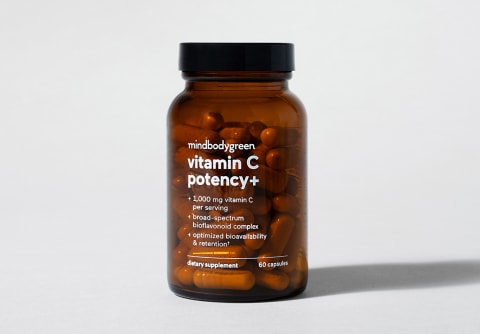The Often-Overlooked Nutrient That Helps Balance Hormones & Lifts Mood
Are you getting enough of this hormone-friendly nutrient?

Advertisement
This ad is displayed using third party content and we do not control its accessibility features.

Beauty & Health Editor
Beauty & Health Editor
Hannah Frye is the Beauty & Health Editor at mindbodygreen. She has a B.S. in journalism and a minor in women’s, gender, and queer studies from California Polytechnic State University, San Luis Obispo. Hannah has written across lifestyle sections including beauty, women’s health, mental health, sustainability, social media trends, and more. She previously worked for Almost 30, a top-rated health and wellness podcast. In her current role, Hannah reports on the latest beauty trends and innovations, women’s health research, brain health news, and plenty more.
Image by Alessandro Biascioli / iStock November 20, 2024 We carefully vet all products and services featured on mindbodygreen using our Our selections are never influenced by the commissions earned from our links. The recent emphasis on slow-living practices in mainstream culture parallels the increased attention on hormonal balance—and that’s not a coincidence. One of the best ways to balance your hormones naturally is to focus on reducing stress—aka, slowing down when you need to. However, what you eat plays a huge role in hormonal balance as well. Consuming whole, balanced meals, eating breakfast before drinking coffee, and skipping high-glycemic foods are all fairly well-known tips, but this nutrient often gets left out of the conversation. 
How vitamin C contributes to hormonal balance
While vitamin C’s role starts in the brain, it trickles down throughout the entire body to help balance hormones. For example, vitamin C plays an essential role in the hypothalamic-pituitary-adrenal (HPA) axis (think: fight-or-flight stress response).
By supporting the oxidant versus antioxidant balance in the adrenals, vitamin C supports emotional well-being and a number of other physiological functions, as adrenal glands are involved in regulating metabolism and healthy blood pressure, supporting the immune system and more.
The benefits of vitamin C certainly don’t stop there, either. This essential nutrient plays a critical role in immune health, skin health, iron absorption, and more. Suffice it to say: You should definitely make sure you prioritize vitamin C for overall health, hormonal balance included.
The takeaway
There are plenty of steps to take when it comes to balancing your hormones, from relieving stress to eating balanced meals and more. Vitamin C also plays a role in hormonal balance, as well as mood regulation—so make sure you get enough. Not sure how much you need to check the box? This guide will help you out.

 Tfoso
Tfoso 


























![Run An Ecommerce SEO Audit in 4 Stages [+ Free Workbook]](https://api.backlinko.com/app/uploads/2025/06/ecommerce-seo-audit-featured-image.png)






